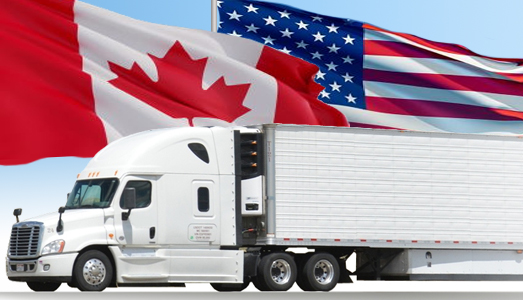TORONTO, Ont. – “Social distancing” is the catchphrase of the year, but for longhaul truck drivers that has been a reality forever.
Now, even as authorities across Canada promote work-from-home plans to limit the spread of Covid-19, cross-border drivers are still expected to deliver.
That adds fresh anxiety to an already high-stress job.
“We are hearing a lot of talk about the need to keep our economy running, but nothing about the safety of those who are helping it keep running,” said veteran driver and charity leader Joanne Mackenzie.
Her view was echoed by blogger Al Goodhall, who complained that nobody was talking to truckers directly about the impacts of the pandemic, despite being on the frontline of the supply chain.
Goodhall, however, urged fellow truckers to work smart and take care of themselves.
“Stay calm…We need to keep working to support our fellow citizens despite the shrill reporting across all media right now,” he said in a series of tweets from the U.S.
Mackenzie said while truckers are used to delays at border crossings, she is worried about the availability of basic supplies on the road.
“Simple things like food and water are hard for us to keep stocked in our trucks,” she said as she headed for Michigan.
Mackenzie said some drivers are concerned because restaurants are closing in the U.S., and trucks stops are cutting back on services such as showers as their staff are afraid of contracting the virus.
Goodhall, who carries all his own food and water in the truck, did not enter a truck stop on his latest run, he said in an email later Monday.
He also said he did not experience any delays at the border.
“There was nothing out of the ordinary. I crossed into Michigan through Port Huron on Saturday morning and crossed into Manitoba through Emerson today. There were no issues, no questions at all from U.S. Customs about Covid-19, and only a query by Canada Customs as to whether I had been out of North America in the past 14 days.”
Greg Manchester, who is working on the Toronto-Montreal route, said he had also heard about problems at truck stops in the U.S.
“It hasn’t affected me personally yet, but as restaurants close, I’m worried about how we are going to eat on the road. If the truckers get sick or quarantined, we are going to be in real trouble,” Manchester said.
Another trucker said he noticed nothing unusual at border crossings.
“They’re asking, ‘Did you fly outside of North America?’ and ‘Did you have any fever?’ Otherwise it’s all normal,” said owner-operator Anil Raveendran.
Asked about reports of long lineups at crossing points, he said there were no unusual delays when he returned to Canada over the weekend, but one of his drivers was held up longer Monday due to a system glitch.
Trucker Jaison James, who returned to Toronto from Dubai via London recently, said he abandoned his planned trip Monday after hearing about major delays at the border.
James said he wasn’t sure whether he would be allowed in because 14 days had not passed since he returned home.
“I don’t want to go to the border and come back.”
A U.S. researcher, who has studied the mental health of truck drivers for years, said truckers, like other workers around the world, are feeling the anxiety, uncertainty, and stress because of the pandemic and the changes to everyday life.
“Truckers are faced with long lines, lost time (and money) waiting for loads, and decreased or eliminated basic services at truck stops,” said Prof. Mona Shattell, associate dean for faculty development at Johns Hopkins School of Nursing.
Shattell told Today’s Trucking that the drivers will rely on one another for support during this difficult time.
“They will communicate with each other to find needed and available services.”


